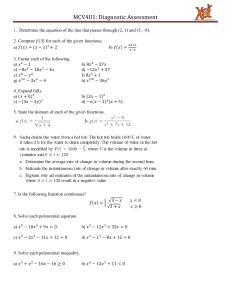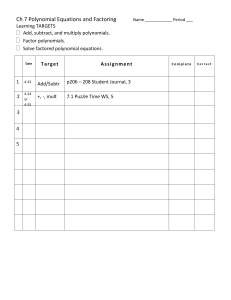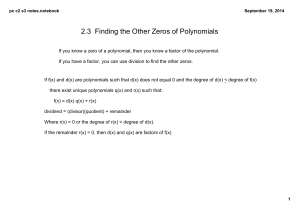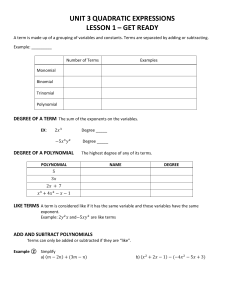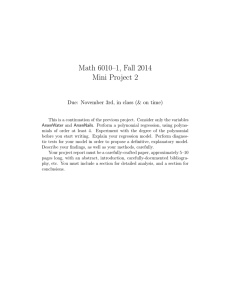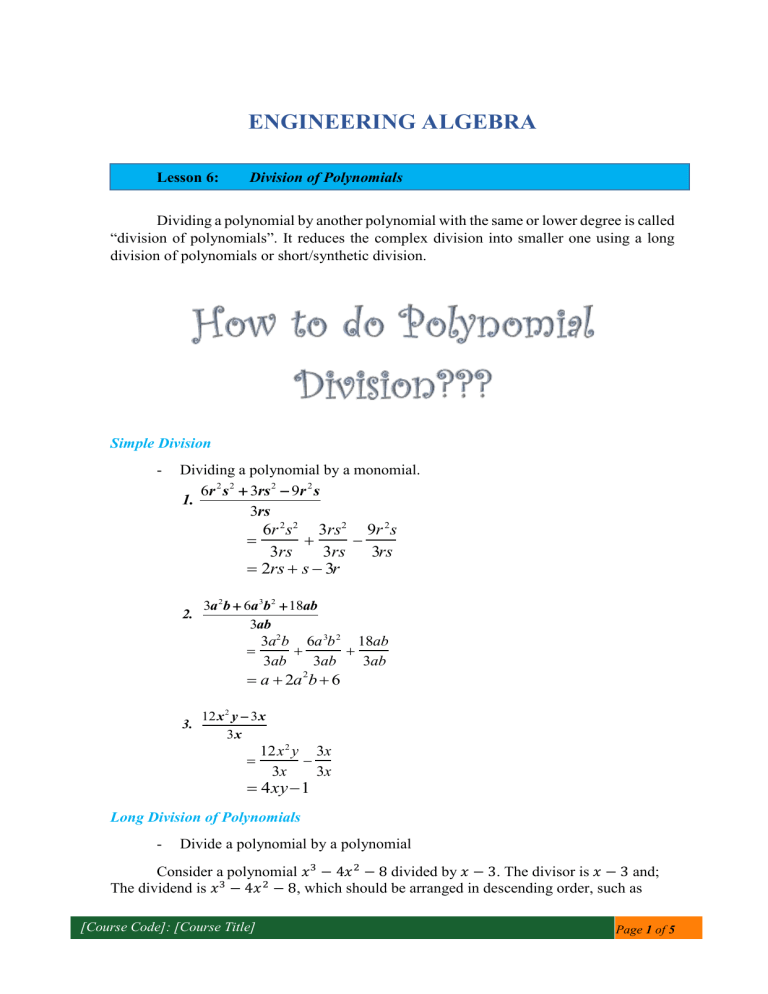
ENGINEERING ALGEBRA Lesson 6: Division of Polynomials Dividing a polynomial by another polynomial with the same or lower degree is called “division of polynomials”. It reduces the complex division into smaller one using a long division of polynomials or short/synthetic division. Simple Division - Dividing a polynomial by a monomial. 6r 2 s 2 3rs 2 9r 2 s 1. 3rs 6r 2 s2 3rs2 9r 2 s 3rs 3rs 3rs 2rs s 3r 3a 2b 6a 3b 2 18ab 2. 3ab 3a2 b 6a 3b 2 18ab 3ab 3ab 3ab 2 a 2a b 6 3. 12 x 2 y 3 x 3x 12x 2 y 3x 3x 3x 4xy1 Long Division of Polynomials - Divide a polynomial by a polynomial Consider a polynomial 𝑥 3 − 4𝑥 2 − 8 divided by 𝑥 − 3. The divisor is 𝑥 − 3 and; The dividend is 𝑥 3 − 4𝑥 2 − 8, which should be arranged in descending order, such as [Course Code]: [Course Title] Page 1 of 5 𝑥 3 − 4𝑥 2 + 0𝑥 − 8 To find for the quotient and the remainder; the procedures are as follows; Step 1: Divide the first term of the dividend by the first term of the divisor, and place the result on top of the bar. 𝑥2 𝑥 − 3√𝑥 3 − 4𝑥 2 + 0𝑥 − 8 Step 2: Multiply the result by each term of the divisor, and place the product below the dividend. 𝑥2 𝑥 − 3√𝑥 3 − 4𝑥 2 + 0𝑥 − 8 𝑥 3 − 3𝑥 2 Step 3: Subtract the obtained product from the upper terms, be careful with the sign of the subtrahend it will be reversed, then bring down the next term of the dividend. 𝑥2 𝑥 − 3√𝑥 3 − 4𝑥 2 + 0𝑥 − 8 −𝑥 3 + 3𝑥 2 −𝑥 2 + 0𝑥 Step 4: Repeat steps 1 to 3, until there’s no term left from the dividend to bring down. 𝑥2 − 𝑥 − 3 𝑥 − 3√𝑥 3 − 4𝑥 2 + 0𝑥 − 8 −𝑥 3 + 3𝑥 2 −𝑥 2 + 0𝑥 −𝑥 2 + 3𝑥 −3𝑥 − 8 Therefore: −3𝑥 + 9 𝑥 2 − 𝑥 − 3 Is the quotient and -17 is the remainder. Ans. −17 Check: 𝑥 3 − 4𝑥 2 − 8 = (𝑥 − 3)(𝑥 2 − 𝑥 − 3) − 17 = 𝑥 3 − 𝑥 2 − 3𝑥 − 3𝑥 2 + 3𝑥 + 9 − 17 𝑥 3 − 4𝑥 2 − 8 = 𝑥 3 − 4𝑥 2 − 8 [Course Code]: [Course Title] Page 2 of 5 Short/Synthetic Division of Polynomials - Divide a polynomial by a polynomial. To use synthetic division: There must be a coefficient for every possible power of the variable. The divisor must have a leading coefficient of 1. 1. Consider a polynomial 𝑥 3 − 4𝑥 2 − 8 divided by 𝑥 − 3 to find for the quotient and the remainder; the procedures are as follows; Step 1: Arranged numerator in descending order. 𝑥 3 − 4𝑥 2 + 0𝑥 − 8 / 𝑥 − 3 Step 2: Place the coefficients inside, according to their order. 1 -4 0 -8 Step 3: Place the numerical of the denominator outside with opposite sign. +3 1 -4 0 Note: synthetic division can only be done when there is a first degree x in the denominator -8 Step 4: Bring down 1st term below the bar. Then multiply 3 by 1 then placed the product below -4 and add, placed the sum next to 1. +3 1 -4 0 -8 3 1 -1 Step 5: Multiply 3 by -1 then placed the product below 0 and add, placed the sum next to 1. Repeat this process up to the last term. +3 1 1 -4 0 -8 3 -3 -9 -1 -3 -17 Remainder The result should be one degree lesser than the given polynomial, and the numbers below the bar such as 1, -1 & -3 are the resulting coefficients. Therefore: [Course Code]: [Course Title] Page 3 of 5 𝑥 3 −4𝑥 2 −8 𝑥−3 = (𝑥 2 − 𝑥 − 3) − 17 𝑥−3 Ans. To check: Cross multiply the denominator of the left side of the equation to the right side, then simplify. 𝑥 3 − 4𝑥 2 − 8 = (𝑥 − 3)(𝑥 2 − 𝑥 − 3) − 17 = 𝑥 3 − 𝑥 2 − 3𝑥 − 3𝑥 2 + 3𝑥 + 9 − 17 𝑥 3 − 4𝑥 2 − 8 = 𝑥 3 − 4𝑥 2 − 8 2. x 3 x 2x 7 2x 1 2 x3 x 2 2 x 7 2 x 1 2 2 2 2 2 2 7 1 1 3 1 2 x x x x 2 2 2 2 1 1 2 2 1 2 1 1 7 2 1 7 4 16 8 _________________________ 1 2 1 7 49 4 8 16 Suggested Video/s: 1. https://www.youtube.com/watch?v=_FSXJmESFmQ 2. https://www.youtube.com/watch?v=FxHWoUOq2iQ [Course Code]: [Course Title] Page 4 of 5 [Course Code]: [Course Title] Page 5 of 5
